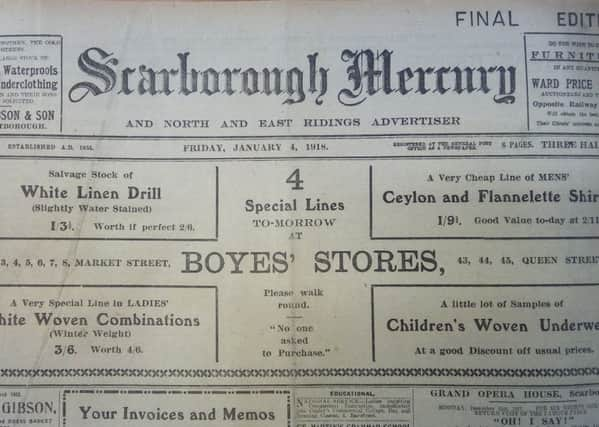1918 court: An army cook's slippery sale of surplus dripping


Defendant, in reply to the charges, said she bought one lot and agreed to buy the other, but she did not know she was doing wrong, as the sergeant from whom she bought it said he was allowed to sell it. She knew it was under the military charge.
The clerk ruled that this was a plea of guilty.
The chief constable (Mr H Windsor) in outlining the case said every person who bought or received from a soldier, or any person acting on his behalf, any army property or regimental stores had to satisfy the court that it was obtained lawfully. Each regiment in the course of their cooking and catering arrangements stored their dripping from day to day until a certain quantity was acquired when it was sold to a contractor and transferred to another army department for use for other purposes. Sergeant Bee was cook sergeant of a battalion at Scarborough and the regimental stores were at the Crown Garage. This sergeant had complete access to the store of dripping. From Mrs Hannard’s own statement to PC Nalton it appeared that about 6.45pm on February 7th, Sergeant Bee went to Mrs Hannard’s shop and said: “Do you want to buy some dripping?” Mrs Hannard said “Yes, are you allowed to sell it?” He replied “Yes, I am allowed to sell it. My lieutenant has given me the privilege to sell it. He only asked me the other day if I had sold any and I told him no, I was going to.” Bee had a large quantity of dripping in his possession, and he said it weighed 42lbs. Mrs Hannard found it was just two or three ounces short. She asked him how much he wanted for it, and he said 30s. She paid him that amount, but did not get a receipt. Mrs Hannard was called upon by the section to show that the dripping came lawfully into her possession. The only point with regard to that transaction was whether she gave a fair price for the dripping. It worked out at about 8½d a lb. As a matter of fact the market price at the present time was from 1s 8d to 2s a lb.
Advertisement
Hide AdAdvertisement
Hide AdProceeding the chief constable said that following the conversation already related, Sergeant Bee said to Mrs Hannard, “Send someone to the bridge end near the Grand Hotel at 6.15pm next Wednesday, the 13th of February, and I will bring you some more. It is too far to bring it down here. Cross Street is much nearer. I can sell it there, but the woman will not give the price.” He asked Mrs Hannard to arrange to send a handcart with her assistant, and she did so. It was whilst defendant’s assistant, Miss Florence Slim was on the cliff with a small two-wheeled cart that PC Nalton saw her and found what she had got in the cart. In consequences of what Miss Slim said to him he visited Mrs Hannard’s shop and got the statement already recorded. Mr Windsor said in addition to the price, there was the secret and surreptitious dealing with the dripping that had to be explained. The circumstances were very suspicious. When the constable first visited the shop she did not straight away tell him about the first lot of dripping which she had bought, but she gave that information freely on a second visit. An officer of the regiment could prove that the dripping was regimental stores and that the sergeant had no right to deal with it. The sergeant was being dealt with by the military authorities.
Defendant said she was quite innocent. Being a sergeant she took his word. If she had had any suspicion at all, she would not have bought it.
In reply to the mayor, she said she thought the arrangement with regard to meeting the sergeant on the cliff was made to lighten the assistant’s burden in fetching the dripping, and his own in bringing it.
The mayor: Did that not strike you as a strange arrangement?
Advertisement
Hide AdAdvertisement
Hide AdDefendant: No, it did not at all. I had asked him if he was allowed to sell before I bought the first lot.
The mayor: Do you know the market price of dripping?
Defendant: I asked him what he wanted and he said 9d a lb, and of course I said I would give it him. I did not think any more about it.
The mayor: Did you not think it was a suspicious thing?
Defendant: Perhaps I should if I had thought, but I did not think at the time. I am a widow and I have been in this business all these years and this is the first time I have had anything to do with the court. I am innocent enough.
The magistrates retired, and on returning the mayor said defendant had pleaded guilty and the charges had been proved against her. It was a serious matter it must be admitted, and the least the magistrates could fine her was £2 10s in each case - £5 in all.